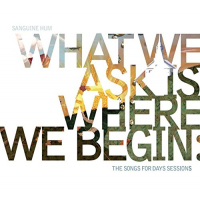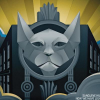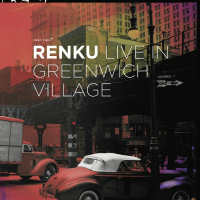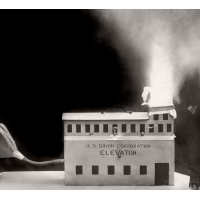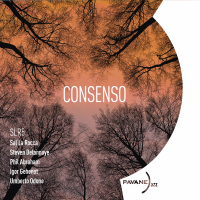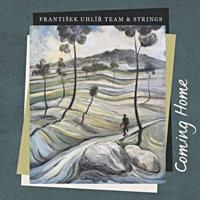Home » Jazz Articles » Extended Analysis » Sanguine Hum: Sanguine Hum: What We Ask Is Where We Begi...
Sanguine Hum: Sanguine Hum: What We Ask Is Where We Begin - The Songs for Days Sessions
What We Ask Is Where We Begin, the group's fourth studio record (well, kinda), doesn't move Now We Have Light's story forward (though that's coming); instead, this collection of what might be considered the group's lost first album (along with additional remixed singles, session out-takes and other unreleased tracks) is more of a look back at, indeed, where Sanguine Hum all began. It's the culmination of a story as complex and knotty as much of its music, but is equally as absurd, atypical and advanced as Sanguine Hum has come to be over not just its past three studio albums (four, including What We Ask) and one live album since 2012, but across its somewhat confused and complex history as The Joff Winks Band, Antique Seeking Nuns, and Nunbient: three groups that share, along with Sanguine Hum, guitarist/singer Joff Winks and keyboardist Matt Baber at their core.
Few groups in this millennium have had as diverse and discombobulated a genesis as Sanguine Hum. Beginning in 2003 as Antique Seeking Nuns—joined by bassist Brad Waissman and drummer Paul Mallyon (who would later leave the group(s), replaced by Andrew Booker in Sanguine Hum)—the group's touchstones included Frank Zappa, Flaming Lips, Aphex Twin and, most significantly, groups from the '70s Canterbury Scene, in particular Hatfield and the North—perhaps the quintessential Canterbury band in its creation of complex and challenging music that was, nevertheless, highly melodic and, equally important, appealingly self-effacing; deep music that, unlike many progressive acts of the era, never took itself too seriously. Certainly with EP titles like Careful! It's Tepid (Troopers for Sound, 2009), Mild Profundities (An Initial Bursting) (Troopers for Sound, 2001) and Double Egg with Chips and Beans (and a Tea) (Troopers for Sound, 2006), and songs including "The Foulness! The Stench!," "It's Pissing Don?" and "Son of Bassoon," Antique Seeking Nuns could never be accused of excess gravitas. And yet, its music was deep, profound and complex, while at the same time demonstrating no shortage of lyricism and songwriting whose subject matter was distanced far from the norm.
Still, while Winks and Baber also explored an interest in ambient/electronica with another nun-themed group, the duo Nunbient, they were also interested in attaining some level of success as songwriters, and not unlike Steely Dan's Donald Fagen and Walter Becker, pursued more radio-friendly material as The Joff Winks Band that they hoped could be sold to other groups. While What We Ask Is Where We Begin's first disc is a sonically upgraded and slightly expanded version of JWB's one and only release, the critically acclaimed but commercially less-successful Songs for Days—an album that, thanks to the disinterest and confusion of Winks' publisher (who clearly had no idea how to position this music), was originally released, without fanfare, as download-only—in hindsight it can now really be considered as Sanguine Hum's real first album.
It's a fair consideration. Yes, there are plenty of appealing and accessible songs, like the poignantly nostalgic "Cast Adrift," which pines for the golden age of children's television, and the darker-hued, balladic "Revisited Song" that nevertheless opens up into a more propulsive chorus and contains lyrics that, according to What We Ask's copious and informative liners, are "a rather interesting mess, replete with self-referencing lyrics à la Matching Mole [another Canterbury group featuring ex-Soft Machine drummer Robert Wyatt and soon-to-be-Hatfielder, guitarist Phil Miller]." But equally. there are more idiosyncratic yet still somehow lyrically appealing instrumentals like the dryly titled "Revisited Song Revisited," and "Milo"—predominantly a story that, driven by a 7/4 combination of guitar arpeggios, electric piano textures and a backbeat-driven rhythm section, tells the story of the titular kid, whose life is forever changed when he discovers Mahavishnu Orchestra's seminal debut, The Inner Mounting Flame (Columbia, 1971), which is paraphrased in the song's aggressive introduction.
It's easy to see why Songs for Days was treated so poorly by a publisher looking for hits; conventional song structures are rarely found, and the nostalgic tinge of most lyrics—which steadfastly avoid teenage angst, love and other typical subject matter for songs about trusting your judgement, what's important in life and teenagers who get on trains and behave like terrorists. Topical? Perhaps; but hardly the stuff of Top 40 radio (when it last existed, that is). In fact, only one song, "Someone Else's Words"—which comes in the album's closing quarter—possesses anything resembling conventional song form, with defined verses and choruses.
And so, Songs for Days may have been a critical success but a commercial flop; but with the benefit of hindsight, it was the start of a group whose popularity in the contemporary progressive world has been in surprising excess of its failure to turn Winks & Baber into a 21st century Becker & Fagen. It's an album filled with rich textures: acoustic guitars aplenty, countered with chiming, chorused and, at times, heavily overdriven electrics; an array of keyboards that is, nevertheless, predicated on the electric piano so dominant in both Hatfield and the North and that group's successor, National Health.
Still, while it's easy to find references aplenty to those Canterbury bands, Sanguine Hum is never imitative; instead, it's more about the spirit than letter, and while Winks and Baber are dominant forces in the group, there's no denying the equal contributions of bassist Brad Waissman and first drummer Paul Mallyon. Together, Sanguine Hum manages, with what was Songs for Days and is now What We Ask Is Where We Begin, to create a collective sound recognizable for Winks' emotive but never over-the-top vocal delivery and surprisingly sophisticated guitar work (despite rarely actually soloing); Baber's similar harmonic depth and textural breadth; and Waissman and Mallyon's seamless navigation of songs that never seem to go where you think they should, but instead go to places even better.
Eschewing overt virtuosity for a more defined collective sound, even instrumentals like "Morning Sun" somehow manage to avoid convention; instead, it's a rock-edged song that moves along episodically and inevitably, yet never seems to go where you think it will, as sections that appear to be passing motifs turn into an ostinato that the band uses to layer keyboard colors and, in this case, a thundering drum solo from Mallyon.
Songs for Days is also distinguished from its original 2007 release by the addition of two miniature "Interludes"—well, not exactly. "Interlude One" was originally tacked onto the end of "Juniper," a song about kite flying that—wonderfully melodic and deemed by the group as "Stairway to Heaven" in "one of many parallel worlds that one interpretation of quantum physics suggests we live in"—makes little sense to end with part of the piano solo, "Bookends," over which Lowrey organ is overdubbed. "Bookends"—originally intended for Songs for Days, was ultimately left off—"It seems crazy now," the group writes, "but we genuinely believed we could fit an episodic piece of modern classical music on the album somewhere." Still, a small portion was ultimately used as the 49-second album opener that perhaps references Hatfield and the North's "The Stubbs Effect," which bookends its self-titled 1974 Virgin debut and segues seamlessly into its first song just as Sanguine Hum does the same, moving into "Revisited Song." "Interlude Two," another extract from the Lowrey organ improv session that was excluded from the original Songs for Days is finally back in place as an atmospheric segue into "Someone Else's Words," as is the fuller piano solo, "Bookends," which closes What We Ask's second CD.
That the band thought it had created its own OK Computer when it first delivered Songs for Days to its publisher is debatable; what is not is that Songs for Days remains a largely overlooked gem that is now, finally, seeing a proper release, and precisely as the band intended it.
The second disc contains a collection of tracks that provide even more insight into the genesis of the group. A new remix of "New Streets"—written by Winks in the 1990s when he was visiting New York City, and which became both a part of the group's early live sets and its first single, reveals a band already looking to form a bond between melodic pop songs and more progressive leanings. "Share My Blues" is another song redolent of Sanguine Hum's signatures—arpeggio-driven guitar lines rather than strummed chords (though Winks does that too)—while "Nothing to Prove" is more brooding, revealing the group's penchant for contrapuntal interplay and the kind of harmonic sophistication that still places less emphasis on overt virtuosity and more a collective end; still, Winks does take a rare guitar solo here that's yet another Mahavishnu Orchestra reference... just played a little slower than John McLaughlin's usual light speed.
Elsewhere, beyond Songs for Days' "Little Machine," there's further opportunity to compare the nascent Sanguine Hum with its predecessor, Antique Seeking Nuns, on "Melted Cheese," which was planned for Careful! It's Tepid, but was abandoned and reworked the following day for that album's "Dead Cheese." Still, it's a terrific example of the group's ability to construct and execute idiosyncratic and humorous piece of progressive music that avoid many of the genre's trappings and, instead, bring in references to groups rarely heard in that context.
Other unreleased tracks from the Songs for Days sessions further demonstrate an early Sanguine Hum trying to birth itself amidst an album meant to sell the group as songwriters—despite there being far too many unexpected moments of weirdness to satisfy publishers looking for radio-friendly music. "Bastard Stretch" revolves around a repeating series of four arpeggiated bars in 5/8, 6/8, 5/8 and 5/8. It's a tough slog counting it out—tougher to play, no doubt, especially when a melody is layered on top—but it somehow manages to retain the intrinsic melodic sensibility that continues to define Sanguine Hum to this day.
There's plenty more on the second disc, but one of the most revealing tracks on What We Ask Is Where We Begin may be a version of "Here At the Western World"—the out-take from Steely Dan's sessions for the superb The Royal Scam (MCA, 1976), but which has only appeared, curiously, on compilations like Greatest Hits (MCA, 1978) and the 1991 expanded edition of 1982's Gold (MCA). The hit that was not to be, Sanguine Hum manages to be both completely faithful while, with Winks' less acerbic vocal delivery, making it their own, despite the song's sarcastic look, as Something Else described it, "[at the] drug-addled depravity they [Steely Dan] saw in contemporary America... this time the object of illicit desire being, most likely, cocaine, as well as prostitution." Far more cynical than anything Sanguine Hum has ever written, it's nevertheless clear, when listening to its chord voicings and overall flow, that the Dan is also a part of Sanguine Hum's DNA.
This may be music from before what Sanguine Hum now consider its second disc—the then-debut The Diving Bell (first released in 2010 by Troopers for Sound but reissued two years later by the group's current label, Esoteric Antenna)—and there's little doubt that a lot has happened in the ensuing years. But it's also clear that, while Baber and Winks were literally dabbling in musical schizophrenia with Antique Seeking Nuns, Nunbient and The Joff Winks Band, each of those three groups that came before Sanguine Hum possessed at least some of the many touchstones that would ultimately emerge and come to define Sanguine Hum. "Quartet," for example, effortlessly moves from near-folkloric musings—with layered acoustic guitars and an early theme delivered on bass guitar—before Baber enters with both chiming electric piano chords and a doubling of the dominant bass line as the song adopts a complicated contrapuntal complexion and, ultimately, a closing section that seems to mesh Pink Floyd's sadly deceased Richard Wright with Tubular Bells-era Mike Oldfield.
What We Ask Is Where We Begin may be early days for Sanguine Hum, but clearly this is a group that, very early on, had the same kind of attention to sound and detail that some of the groups that form its DNA—most specifically Steely Dan—also had but, quite remarkably, without the bigger budgets and label support. That What We Ask Is Where We Begin—and Diving Bell, for that matter—is so satisfying musically and lyrically, but also sounds so damn good says a lot about what Baber and Winks were working towards so early in their careers.
While we wait to find out what happened to Don, the buttered cat and the rest of Now We Have Light's Dystopian future, What We Ask Is Where We Begin: The Songs for Days Sessions is a chock-filled interim release that provides real comparative insight into how Baber, Winks, Waissman and, subsequent to Mallyon, drummer Andrew Booker took the diversities of Antique Seeking Nuns, Nunbient and The Joff Winks Band and merged them into Sanguine Hum... that rarest of mergers that actually leverages the strengths of its individual parts into something that is a far greater—and even better—whole.
Track Listing
CD1 (Songs for Days): Bookend; Revisited Song; Before We Bow Down; Cast Adrift; Juniper; Interlude One; Little Machines; Milo; It Grows in Me Garden; Interlude Two; Someone Else's Words; Hedonic Treadmill; Ace Train; Revisited Song Revisited; Morning Sun. CD2 (Where We Begin): Remixed Singles: New Streets; Share My Blues; Nothing Left to Prove; Unreleased Music: Apple Pie; Cartoon Friends; Bastard Stretch; Double; Dressed Up in Rags; Quartet; To Them Only; Here at the Western World. Session Out-Takes: Perc Tune (There's No Hum); Melted Cheese; Revisited Song Revisited (Again); Morning Sun (Basic Take); Bookends (Solo Piano Version).
Personnel
Sanguine Hum
band / ensemble / orchestraJoff Winks: vocals, guitars, harmonium, percusasaion, additional keys (CD2#7), sound effects. Matt babe: acoustic and electric piano, synths, organ, harmonium, percussion, drums (CD2#4, CD2#9), sound effects; Brad Waissman: bass guitar, double bass, backing vocals; Paul Mallyon: drums, percussion, backing vocals.
Album information
Title: Sanguine Hum: What We Ask Is Where We Begin - The Songs for Days Sessions | Year Released: 2016 | Record Label: Esoteric Antenna
Tags
About Sanguine Hum
Instrument: Band / ensemble / orchestra
PREVIOUS / NEXT
Support All About Jazz
 All About Jazz has been a pillar of jazz since 1995, championing it as an art form and, more importantly, supporting the musicians who make it. Our enduring commitment has made "AAJ" one of the most culturally important websites of its kind, read by hundreds of thousands of fans, musicians and industry figures every month.
All About Jazz has been a pillar of jazz since 1995, championing it as an art form and, more importantly, supporting the musicians who make it. Our enduring commitment has made "AAJ" one of the most culturally important websites of its kind, read by hundreds of thousands of fans, musicians and industry figures every month.


